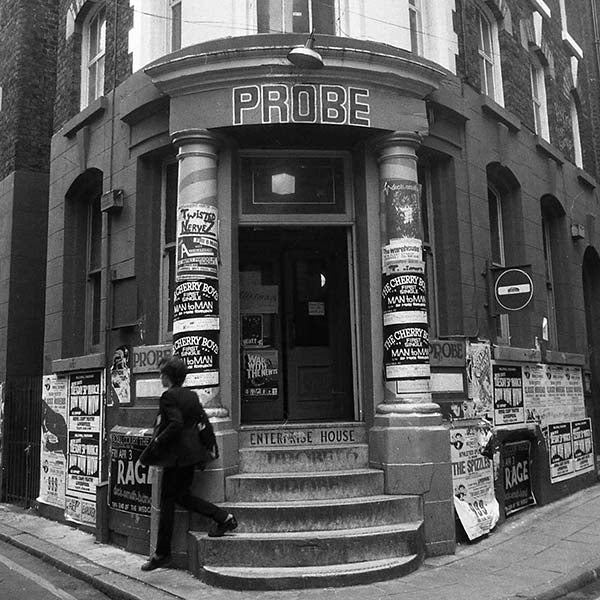Writer Jeff Young takes us back to Liverpool’s Mathew Street of the 70’s and 80’s and the legendary club Eric’s, reconnecting with the ghosts of post-punk past.
This article was first published in Dorothy's Studio Stories Magazine (Issue No. 1) in Autumn 2021.
GHOST PUNK
−Words by Jeff Young
In the twilight zone I lived in – a shadow land where books I didn’t quite understand and films that baffled and exhilarated me bled into my dreams – I used to spend my dole money in second hand bookshops, cinemas and record stores. The books were mostly European or American, the likes of Kafka, Genet and Celine, Ferlinghetti and Patchen; the films were mostly subtitled European cinema or auteur directed American New Wave. It helped if they were mostly set in strange cities, or in the night time, or about lonely souls and outlaws. I wore the moody and pretentious badge with pride. I didn’t have a girlfriend...
I listened to film soundtracks, Lenny Kaye’s ‘seminal’ Nuggets compilation, (‘seminal’ was a word much favoured by the likes of me along with ‘amphetamine rush’ and ‘angst’), Captain Beefheart; Can; Peter Hammill, anything caught up in the imaginative weather emanating from the general direction of David Bowie’s mind- storm – Lou and Nico, the Stooges, the Velvet Underground – and the slipstream freaks spilling out of glam rock’s crepuscular nebular such as Roxy Music, Alice Cooper, the Doctors of Madness, Cockney Rebel, New York Dolls and Jobriath. It mattered enormously that all of this music was unruly, disturbed and disturbing, that it took drugs and wore a dead man’s overcoat and a hint of mascara. It mattered that it was no stranger to pharmaceuticals. It mattered that it hardly ever smiled, apart from when it had done something delinquent and unauthorised.
In the aftermath of punk (in truth before and during punk for post-punk existed as a genetic ancestor and contemporary and bastard sibling of the Sex Pistols et al) there came the sons and daughters of these arthouse delinquents, and on my first sighting of Mark E. Smith in Liverpool’s Eric’s I recognized him immediately as being somehow from the same universe as me, as being a Penguin Modern Classic and Picador self-educator with a bedroom full of records that contained secret information. On stage in Eric’s, The Fall were like some kind of xeroxed samizdat publication in human form – a seditionary news bulletin from the outer edges of a derelict, industrial wasteland. Indeed, they sang of industrial estates and rebellious jukeboxes, the slaughterhouse and mental hospital. They seemed to be tuned into their own secret radio station but I too had listened to these broadcasts on my transistor radio – signals from a broken satellite, transmitted into the minds of suburban dole queue kids in charity shop, dead man’s clothes. The atmosphere generated by The Fall was moody and intense, like a talent show in a dodgy pub in a new town with no buses. It was thrilling.
It struck me that this was art. And it didn’t have anything to do with tabloid headlines or the Sex Pistols antics on Bill Grundy. This was the kind of art Andy Warhol or Brian Eno might make if they went to a crap school and worked as a clerk in a Northern England shipping office. Always on the edge of disintegration, this music-as-manifesto was exactly what I’d been looking for. As I walked home down the dock road, past the scrap heaps and rusting cranes of a dying Liverpool, I was walking through The Fall’s music; it was the soundtrack to my own internal cinema. Vic Godard’s library skulking Subway Sect, Wire’s minimalist sonic sculptures, the DIY thrill of The Raincoats, Howard Devoto’s polytechnic intellectualism – it felt like music as oblique strategy, like epiphany in sound.
Rumours from New York of Tom Verlaine’s Television had been echoing down the alleyway for years. Little Johnny Jewel on the Ork label was the holy grail of vinyl addicts looking to mainline something other, as though transfixed by the sodium glow of street lights or something unattainable and alien. I pestered record shops for that record for months – it hadn’t even been released – and when I finally held the record in my hands it felt like holding neon. When Howard Devoto turned to face the audience in Eric’s and uttered the paranoid literature of The Light Pours Out of Me it was like a convulsion, an upheaval of the collective nervous system.
Mathew Street was central to all this – not just because of Eric’s but because of that feeling I’d had for a while that this was Liverpool’s underground republic, a place where noncomformist disobedience and a kind of idiot savant intelligentsia were in residence: I had had a bargain basement, secondary modern education but I like to think/delude myself I wore it with the swagger of a polymath as I skulked from Probe Records to the pub where I would pore over the sleeves of Pere Ubu’s 30 Seconds Over Tokyo or the inky scrawl of a Fall 45. These artefacts were occult texts, inscribed with biro literature, underground knowledge. And the music in the grooves – the spiral scratch – had a sort of drab-glamour, a corroded beauty, a sonic patina where the ugly and the beautiful enter into each other, abraded and deformed. I had the feeling that this music – this thing called Post Punk – was more than music; it was a way of looking at and thinking about the world, (admittedly the world mostly meant my inner-world of messy anxiety and disintegration).

Image - Francesco Mellina
There was a great sense of surging energy, of rapidly moving on inside this music. A powerful sense of seizing the moment and devouring ideas from previously prohibited territories, kicking the doors in, ransacking the place for inspiration and from the spoils and pilfer making art. Patti Smith’s Piss Factory, Peter Hammill’s Nadir’s Big Chance, J.G. Ballard’s Atrocity Exhibition, Kurt Schwitters’ Merz collages,Tarkovsky’s Stalker – materials such as these mutate, becoming something new in the process. Perhaps the exemplary local artefact of all this was the first EP by the Teardrop Explodes, a sonic drug capsule of dark, lysergic materials.
On stage in Eric’s one night the Pop Group and Pere Ubu create an altered state into which I fall. It’s a sonic collage of King Tubby, Augustus Pablo, Don Cherry, Ornette Coleman, The Last Poets, Roky Erickson, James Brown, The Velvet Underground and ghosts in a derelict industrial zone. Difficult mental states, insomnia, sardonic humour, anxiety, neurosis and feral derangement were the viral components of this fever spreading medicine show.
This is what Post Punk did. This is what it meant to me and countless others – a way of being, seeing, thinking that was unauthorized.
JEFF YOUNG IS THE AUTHOR OF GHOST TOWN: A LIVERPOOL SHADOWPLAY, AVAILABLE NOW FROM LITTLE TOLLER BOOKS
This article was first published in Dorothy's Studio Stories Magazine (Issue No. 1) in Autumn 2021.

